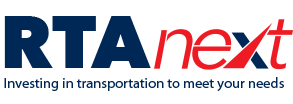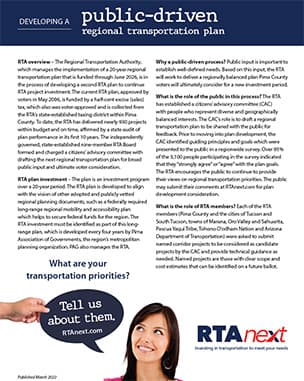
About RTA Next
RTA Next is a public-driven regional planning process, established by the Regional Transportation Authority Board, to develop a new regional transportation plan for the greater Tucson region.
A new regional transportation plan will continue the delivery of transportation projects beyond June 2026, when the current RTA plan and half-cent excise (sales) tax will expire. The current plan and tax were approved by Pima County voters in May 2006. A new plan and tax extension also will require voter approval.
The RTA was established by the state Legislature as an independent regional authority to develop a regional transportation plan and collect funding from the RTA taxing district within the boundaries of Pima County. The RTA is governed by a nine-member regional body of local, county, state and tribal officials. RTA state law dictates one vote per member, which encourages regional cooperation and collaboration.
Since the RTA is a regional authority, the development of the regional transportation plan itself is not jurisdiction driven. The RTA Next plan development process is driven by regional public participation, starting with a geographically diverse citizens’ advisory committee (CAC) established by the RTA Board.
Guided by public feedback on CAC-adopted plan development goals, RTA members, local, state and tribal governments, submitted projects through the RTA’s Technical Management Committee for consideration in plan development.
The public weighed in on the guiding principles and goals in late 2019. More than 85% of the 3,100 survey respondents indicated agreement or strong agreement on the following goals: improve the condition of existing roadways, provide efficient crosstown mobility, reduce congestion and reduce crashes at intersections.
After learning about regional needs and the transportation funding environment, the CAC reviewed the initial list of regional projects and narrowed down a selection of projects, offering plan recommendations to the RTA Board in December 2023.
The plan development process includes technical guidance from a technical committee of jurisdiction representatives to assess project functionality and other plan performance details.
The RTA Board is currently reviewing recommendations from the CAC and TMC to prepare a final draft for public review and input.
The contents of a draft plan will need to match the anticipated RTA revenues that would be collected over a new 20-year period, based on pessimistic revenue estimates prepared by the University of Arizona Eller College of Management.
Once a draft plan is finalized, the RTA will conduct extensive outreach across the region to seek public review and input. Based on public feedback, the RTA Board may further revise the plan before placing it on the ballot for future Pima County voter consideration. RTA member jurisdictions will review and comment on the final draft as well before board approval.
Jurisdictions conduct public outreach for jurisdiction-developed local plans, while the RTA conducts public outreach across the region for development of its regional transportation plan.
For more information about the current plan and project delivery, please visit RTAmobility.com.
The RTA Taxing District
The Regional Transportation Authority is a political subdivision that collects revenue from its state-established taxing district within the boundaries of Pima County.
In 2006, Pima County voters approved the collection of a countywide half-cent (transaction privilege) sales tax to fund the 2006, 20-year regional transportation plan, which are both voter-approved through June 2026.
In order to fund a second 20-year plan, the RTA half-cent sales tax would need to be extended for another 20 years.
Anyone who shops within the district pays the half-cent sales tax. The tax applies to visitors as well as residents, businesses and utilities in the district.
The tax revenues are collected by the Arizona Department of Revenue, which does not provide the RTA with a point of sales report. Since revenues are collected regionwide, the RTA planning process looks to provide fair distribution across the region to ensure everyone benefits.
The RTA tax is assessed in six major categories:
- Retail sales*
- Contracting
- Utilities
- Restaurant and Bar
- Rental of Real Property
- Rental of Personal Property
*Grocery and pharmaceutical items are tax-exempt.
During the outreach phase of RTA plan development, the public has the opportunity to provide input on how much and where the RTA dollars should be spent. Pima County voters will have the final say when they consider the plan at a future election.
Plan Development Goals
- Manage and reduce congestion by using strategies and tools such as travel demand management and intelligent transportation systems
- provide safe, reliable, healthy, and efficient regional mobility
- improve transit ridership
- reduce crashes among vehicles, bicycles, pedestrians, and others
- reduce wildlife-related crashes and provide wildlife connectivity
- improve the conditions of existing infrastructure for all transportation modes
- provide safer, more-connected bicycle and pedestrian facilities, and enhance health through active transportation options
- improve quality of air, water and wildlife habitat, and reduce greenhouse gas emissions and vehicle miles traveled
- improve multimodal performance and access to key destinations including, but not limited to, activity centers, workplaces, medical care, educational facilities, and grocery stores
- add multimodal functionality to key corridors
Transportation Insights
- Investment in the region’s transportation system leads to enhanced regional mobility, safety and reliability to make each of our communities a better place to live.
- A continuation of the RTA sales tax within Pima County would help meet the transportation demands to address varied user needs within our region and will leverage other transportation resources, such as federal grants.
- The countywide RTA sales tax provides the most flexible transportation funding solution to address regional transportation priority needs, since the public can help determine where the dollars are spent.
- Current RTA revenues represent the largest annual average transportation funding source(more than $100 million) for our region to supplement state and federal resources (a combined $51 million annually in comparison).
- Through 2045, the region has identified funding needs totaling $19.6 billion. A new RTA plan and tax extension, if approved by voters, would contribute approximately $2 billion toward addressing that funding need.
RTA Plan Development Timeline
- May 2018 – Established RTA Citizens Advisory Committee to draft a new 20-year regional transportation plan
- May 2018 to January 2020 – Development, public review and CAC-adoption of plan development guiding principles and goals
- January 2022 – New members added to the CAC · August 15, 2022 – Updates made to guiding principles and goals
- Fall 2022-December 2023 – CAC developed recommendations for a draft plan and funding allocations for RTA Board review
- Dec. 7, 2023 – Initial RTA Board review of the CAC recommendations
- Winter 2024 – RTA Board is considering input from the CAC and technical committee to prepare a final draft
- Spring 2024 – Public feedback on initial draft plan; draft plan refinement as needed
- Summer/Fall 2024 – RTA Board reviews public feedback and finalizes plan
- Fall 2024/Winter 2025 – RTA Board requests plan and sales tax initiatives be placed on Pima County ballot and RTA continues public education of plan contents
- May 2025 – Election for new RTA plan consideration by eligible voters of Pima County

